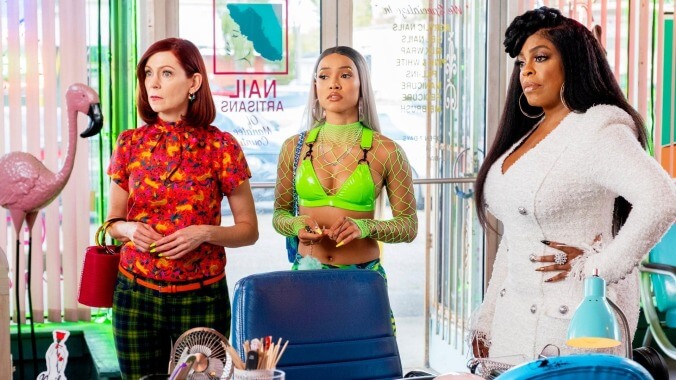The Russian Mafia. Undercover drug lords. Nosy cops. Cartoonishly menacing casino owners. The Dixie Mafia. We’ve encountered quite a few characters since we first stepped into Claws’ Nail Artisans of Manatee County over four years ago.
Each figure has uniquely contributed to the chaos that underscores this neon-piped drama that has been classified by some of the show’s creatives as a “Florida noir.” While the circumstances have often ramped up its more absurd elements, the show has always revolved around an eccentric group of manicurists and friends pursuing total control over their own lives. More acutely, Claws largely followed the ascension of salon owner-turned-crime boss Desna Simms (Niecy Nash-Betts), who went from simply wanting to divest her business from a longtime money laundering scheme to gunning for the title of “Queen Of Palmetto” with each new gambit.
The most compelling thread that strings these last episodes together is the strained nature of the close-knit relationships we’ve come to know over the years. Season four picks up some time after last season’s (literally) explosive finale. After a pregnant Quiet Ann (Judy Reyes) set fire to the casino and effectively drew a line in the sand between her and former close friend Desna, the final season focuses on the group’s struggle to navigate the split and the repercussions they suffer in their attempts to remain neutral. Jenn (Jenn Lyon), Virginia (Karreuche Tran), and Polly (Carrie Preston) are often tasked with secretly engaging with Ann, which gets increasingly complicated once Ann joins forces with Clayton.
This development reveals Claws’ strengths and weaknesses simultaneously. The ongoing, rather violent rift itself is a testament to the show’s willingness to explore deeper consequences that shake up the dynamic. Ann and Desna’s conflict adds a new set of stakes that extend well beyond the tattered remains of their friendship: As Clayton’s new right hand, Ann is now a dangerous opposing force and a near-deadly liability, which is as intriguing as it is heartbreaking.
But even before the rise of her newfound alliance, Ann is a person that is now on the outskirts of the Artisans crew’s illegal dealings, making her dangerous enough for the rest of the women to approach her with severe caution. Yet, years of criminal activity have seemingly failed to sharpen the women’s collective instincts, leading to complications that feel like easily triggered traps. Even in midst of all the fun and intrigue, it rings of a lost opportunity to really develop some of these beloved characters beyond the caricatures they’ve slowly become, leaving most of the meaty development to Desna and Ann.
Even in Desna’s case, her usual intuitiveness is dulled to make way for a new love interest, a delivery person named Tony (Anthony K. Hyatt). Without any remarkable tension to speak of, Hyatt’s addition functions largely as an additional wrinkle in Desna’s overarching plans for domination—one that isn’t neither necessary nor packs any real punch, given all that this group has endured over the years. The same can mostly be said for guest star Linda Hamilton, who plays zen wellness coach and Dean’s (Harold Perrineau) new girlfriend, Eve. Their sudden bonds aren’t nearly as enthralling as their relationships with Roller (Jack Kesy) and Virginia, so it feels like expended energy that could have been devoted to more pressing matters, especially when we’re so close to the end.
Ultimately, Claws works best (and is most engaging) when it sticks closely to the five women that defined this show’s appeal from the beginning. When you strip away the carousel of wacky guest appearances, the bizarre vignettes, and the more distracting B-plots, you’re still left with an ensemble that has developed a truly rare chemistry that sets this drama apart from the rest. Nash-Betts continues to find and revel in new levels of ambition in Desna, striking a working balance between maternal business owner and ruthless femme fatale. Watching her go toe-to-toe with Reyes, who telegraphs Ann’s determination to build a better life for her child with such earnest desperation, leads to some of the season’s most gratifying moments.
Preston resumes her position as the show’s delightful wild card, as Polly effortlessly switches between personalities. Lyon and Tran hold steady as Jenn and Virginia’s loyalties to Desna are tested in major ways, causing both women to reevaluate their relationships with the burgeoning crime boss. Though Ann’s choice to strike out on her own means that we don’t get to see these women together as much, the few moments they share are appropriately intense and offer glimpses of just how well these seasoned actresses work together.
There’s still some mystery as to how this ends (only the first eight episodes of the season were screened for critics). For a series that’s harbored its fair share of twists throughout its four-year stint, the fates of every character—and their various relationships—remains uncertain. And therein lies the final crackle of excitement: Though it has lived to be many things, one thing Claws has never been, is predictable.


